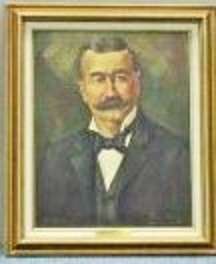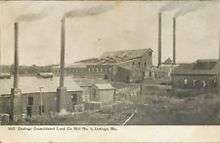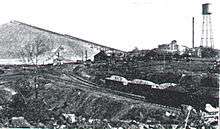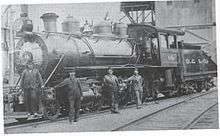Desloge Consolidated Lead Company
Desloge Consolidated Lead Company was a lead mining company in the Southeast Missouri Lead District that was operated by the Desloge family in the 19th and early 20th century. The Desloge lead operations in the "Old Lead Belt", in the eastern Ozark Mountains, helped Missouri become the world's premier lead mining area.
History
Desloge Lead Company




The businesses that would become the Desloge Consolidated Lead Company began around 1824, when Firmin Rene Desloge — founder of the Desloge Family in America — built a smelting furnace as an extension of his mercantile business in Potosi, Missouri.[1][2][3]
His son, Firmin V. Desloge,[4][5] expanded mining operations and moved management to Bonne Terre, Missouri.[6] On June 5, 1874, a charter was granted to the Missouri Lead and Smelting Company, which was renamed the Desloge Lead Company on February 21, 1876. In 1876 and 1877, the company sank three shafts and built a new mill in Bonne Terre.
A fire in March 1886 destroyed the concentrating mill plant and damaged the rest of the surface plant. The following year, the company's remaining assets were sold to St. Joseph Lead Company, which made Firmin V. Desloge a trustee on its board, a post he would hold until his death. This merger helped the St. Joe company become the "greatest lead-mining and smelting company in the world.[7]
Desloge Consolidated Lead Company
After the fire, Desloge and his family took an option on a piece of land owned by the Bogy family which was called "Mine-a-Joe", and started another mining operation under the name Desloge Consolidated Lead Company. The new company cleared the land and built company houses for its workers just west of present-day Desloge, Missouri.[8]
In 1893, the Desloges opened a new mine in St. Francois County, Missouri, just north of the St. Joe Lead Company property in Bonne Terre, on a tract of land originally granted to Jean Bte. Pratte and designated as U. S. Survey No. 3099.[3] The mill and smelting plant could produce 500 tons of lead per day.[9][10]
Firmin Desloge II expanded lead mining operations by buying the Bogy Lead Mine Company and the St. Francois Mining Company. Along with his partners, he organized a new company called Desloge Consolidated Lead Company. The company sank mine shafts and built mills, smelting furnaces, and power stations.[11]
Ultimately, the company's lead operations required a massive real estate effort involving hundreds of land leases, purchases, options, rights of refusals, mineral rights, chattel mortgages, deed transfers, quit-claims, trust deeds, judgment sales, sheriff’s sales, bankruptcy sales, grants, bonds, notes, and various claims from area miners covering thousands of acres and hundreds of parcels of land.[12]
Railroads
To serve the Desloge and St. Joe mines, Firmin Desloge II built the first railroads to penetrate the disseminated lead field of St. Francois County: the Desloge Railway, the Mississippi River and Bonne Terre Railway[13] and the Valley Railroad.
Desloge also helped develop the St. Louis, Iron Mountain and Southern Railway (aka the Iron Mountain Railroad), which opened in 1874 from St. Louis to Texarkana, Arkansas. When the St. Joseph Lead Company built a 13.5-mile narrow-gauge railroad from its mines to the Iron Mountain tracks at Summit in Washington County, the Desloge Company paid one-third of the costs.
Late-century lobbying
The Revenue Act of 1894, also known as the Wilson-Gorman Tariff, lowered protective tariffs on lead (although it raised rates on sugar and other materials). The prospect of cheaper imported lead threatened the Desloge company and other southeast Missouri lead businesses, so Firmin Desloge II immediately went to Washington, D.C., to lobby for repeal. In the meantime, he spent part of his own fortune to continue operations, retained his employees, and stockpiled instead of sold his pig lead.[14] The lead industry's lobbying efforts paid off in 1897, when the Dingley Act once again raised barriers to lead imports.[15]
1900s
Around 1916, the Desloge Consolidated Lead Company moved its corporate offices from Desloge to the 1892 Rialto Building in downtown St. Louis. Despite the city's history as a fur-trading center, "more money passed through St. Louis as a result of the lead business in Missouri,” Robert E. McHenry wrote in his 2006 book Chat Dumps of The Missouri Lead Belt.[16]
Sale
In 1929, the company sold its plant to the St. Joe Lead Company[17] for $18 million[18][19] ($268,011,628 today[20]). A trade newspaper wrote, “With the absorption of the Desloge concern by the St. Joseph Lead Company, one of the oldest mining companies of the district goes out of existence as a company.”[19]
The Desloge Consolidated Lead Company, and specifically Firmin Rene Desloge and Firmin Desloge II, were described in 1932 as "the most distinguished of American mining engineers".[21]
The modern Desloge Consolidated Lead Company
The name Desloge Consolidated Lead Company was used for a company formed in 2004 as an investment holding company by a Desloge family descendant, Christopher Desloge.[22] The name was changed in 2005 to Madaket Growth, LLC.
References
- Huger, Lucie Furstenberg. The Desloge Family in America. St. Louis: Nordman Printing Co., 1959.
- HISTORY OF THE LEAD BELT OF ST. FRANCOIS COUNTY MISSOURI By A. J. Norwine (1924)
- History of St. Joe Lead Company http://www.rootsweb.ancestry.com/~mostfran/mine_history/stjoe_history.htm
- Conard, H.L. (1901). Encyclopedia of the History of Missouri: A Compendium of History and Biography for Ready Reference. 2. Southern history Company, Haldeman, Conard & Company, proprietors. p. 268. Retrieved 2015-07-24.
- Stevens, Walter B. St. Louis The Fourth City 1764–1911. 2 vols. St. Louis-Chicago: S. J. Clarke Publishing Co., 1909 and 1911.
- "Archived copy". Archived from the original on 2010-09-27. Retrieved 2010-06-25.CS1 maint: archived copy as title (link)
- Daily Journal (Park Hills, Missouri), Friday, April 24, 1987, accessed May 20, 2016
- Thomas A. Rickards. A History of American Mining, Maple Press Co., New York, 1937 online version
- Ingalls, Waiter Renton. Lead and Zinc in the United States. Hill Publishing Company, London, England, 1908
- History Of The Lead Belt Of St. Francois County Missouri By A. J. Norwine (1924)
- The Desloge Chronicles, Christopher D. Desloge, compilation of Desloge letters and history, 2010
- A large collection of original documents from early 1800s to 1920s evaluated by the Missouri Department of Natural Resources, Art Hebrank, Missouri Mines State Historic Site, Park Hills, MO. Documents remain in the possession of the Desloge Family, St. Louis, MO
- Sullivan, John J., History of St. Joe and Desloge Railway and Missouri River and Bonne Terre Railroad, handwritten, Railroads Collection, Desloge Railway, Missouri Historical Society archives
- Globe-Democrat, Editorial, November 18, 1908.
- Mitchell, S. Duffield (December 1909). "Tariff on Zinc Ores". Report of the Proceedings of the Annual Session, Volumes 11-12. 11: 226.
- Chat Dumps of The Missouri Lead Belt, St. Francois County, With an Illustrated History of the Lead Companies that Built Them. McHenry, Robert E., 2006, Copy accessed at Missouri Department of Natural Resources, Missouri Mines State Historic Site, Park Hills, MO
- "St. Joe Lead Company to Absorb Desloge Lead Co". rootsweb.ancestry.com. Retrieved 2015-07-24.
- Desloge Consolidated Lead Company records at Missouri Historical Society, St. Louis, MO
- May 31, 1929 The Lead Belt News
- Federal Reserve Bank of Minneapolis. "Consumer Price Index (estimate) 1800–". Retrieved January 1, 2020.
- "Thomas A Rickard's A History of American Mining". scribd.com. Retrieved 2015-07-24.
- Secretary of State, State of Missouri, Corporations Division
Primary sources
- The Desloge Family Collection at Missouri Historical Society, St. Louis, MO
- Desloge Consolidated Lead Company records at Missouri Historical Society, St. Louis, MO
- The Rozier Collection at Missouri Historical Society, St. Louis, MO
- Southeast Missouri Mining and Milling. Doe Run Company. 2004.
- Potosi (Missouri) Historical Society
External links
- "Thomas A Rickard's A History of American Mining". scribd.com. Retrieved 2015-08-02.
- "History of the Lead Belt". rootsweb.ancestry.com. Retrieved 2015-07-24.
- "St. Joe Lead Company to Absorb Desloge Lead Co". rootsweb.ancestry.com. Retrieved 2015-07-24.
- "The Story of Lead Mining and Milling", a 1934 short film by the U.S. Bureau of Mines, made with the cooperation of St. Joseph Lead Company five years after it bought Desloge Consolidated Lead Company.
- Radio Interview with Christopher Desloge KFMO Radio, with permission. https://www.youtube.com/watch?v=ZWUyQERXEj0
- Talk with City of Bonne Terre, Mo., by Christopher Desloge
- "History of Desloge Consolidated Lead Company operations". dailyjournalonline.com. Retrieved 2019-08-19.
- "History of Lead Mining in Missouri". The Missouri Department of Natural Resources.